formerly eScholarship Editions


|
|
|
|
Your search for
Public
in rights
'Philosophy' in subject
found 56 book(s). | Modify Search | Displaying 21 - 40 of 56 book(s) | |
| 21. | 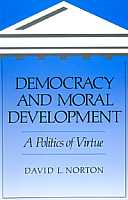 | Title: Democracy and moral development Author: Norton, David L Published: University of California Press, 1990 Subjects: Philosophy | Political Theory | Ethics Publisher's Description: At a time when politics and virtue seem less compatible than oil and water, Democracy and Moral Development shows how to bring the two together. Philosopher David Norton applies classical concepts of virtue to the premises of modern democracy. The centerpiece of the book is a model of organizational . . . [more] Similar Items |
| 22. | 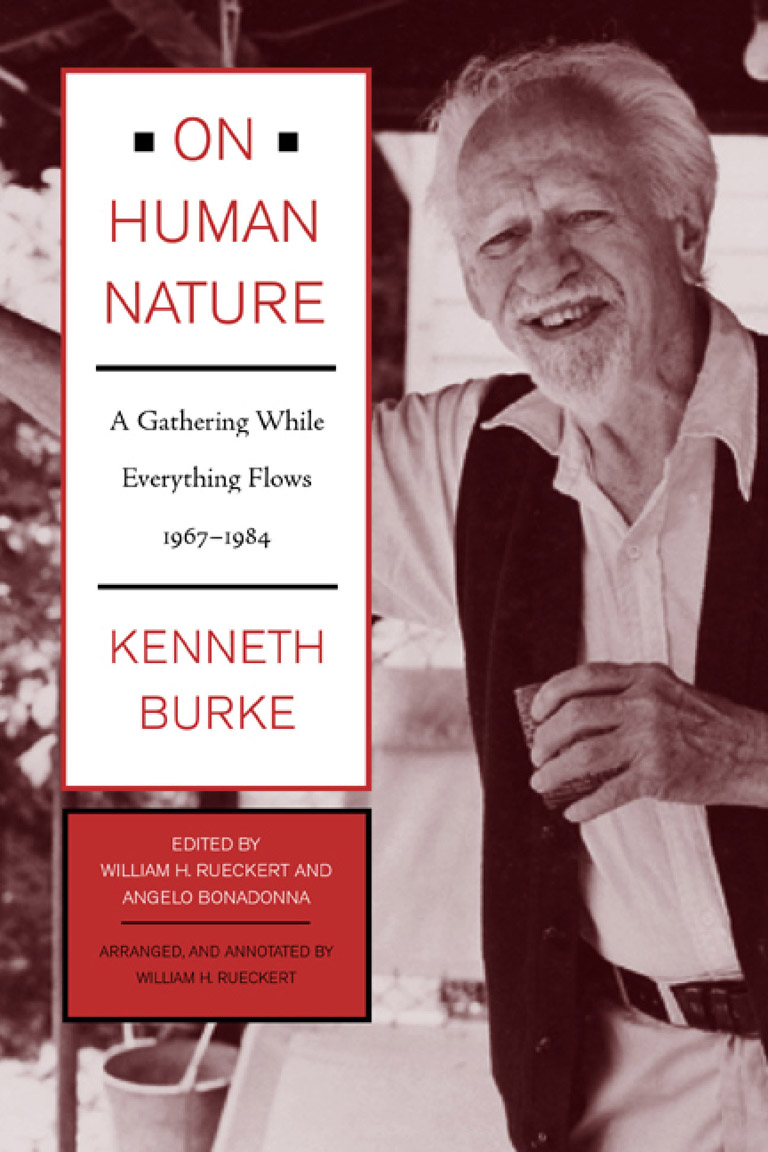 | Title: On human nature: a gathering while everything flows, 1967-1984 Author: Burke, Kenneth 1897- Published: University of California Press, 2003 Subjects: Literature | Literary Theory and Criticism | Intellectual History | Rhetoric | Comparative Literature Publisher's Description: On Human Nature: A Gathering While Everything Flows brings together the late essays, autobiographical reflections, an interview, and a poem by the eminent literary theorist and cultural critic Kenneth Burke (1897-1993). Burke, author of Language as Symbolic Action, A Grammar of Motives, and Rhetoric of Motives, among other works, was an innovative and original thinker who worked at the intersection of sociology, psychology, literary theory, and semiotics. This book, a selection of fourteen representative pieces of his productive later years, addresses many important themes Burke tackled throughout his career such as logology (his attempt to find a universal language theory and methodology), technology, and ecology. The essays also elaborate Burke's notions about creativity and its relation to stress, language and its literary uses, the relation of mind and body, and more. Provocative, idiosyncratic, and erudite, On Human Nature makes a significant statement about cultural linguistics and is an important rounding-out of the Burkean corpus. [brief] Similar Items |
| 23. | 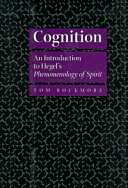 | Title: Cognition: an introduction to Hegel's Phenomenology of spirit Author: Rockmore, Tom 1942- Published: University of California Press, 1997 Subjects: Philosophy | Intellectual History Publisher's Description: Hegel's Phenomenology of Spirit , the philosopher's first and perhaps greatest work, is the most important philosophical treatise of the nineteenth century. In this companion volume to his general introduction to Hegel, Tom Rockmore offers a passage-by-passage guide to the Phenomenology for first-time readers of the book and others who are not Hegel specialists.Rockmore demonstrates that Hegel's concepts of spirit, consciousness, and reason can be treated as elements of a single, coherent theory of knowledge, one that remains strikingly relevant for the contemporary discussion. He shows how the various conceptions of cognition developed in the text culminate in absolute knowing, which Rockmore reads, in opposition to the frequent religious readings of Hegel, in a wholly secular manner. Unlike commentators who isolate Hegel's text from its philosophical origins, Rockmore analyzes the book in the philosophical context from which it emerged, lucidly discussing notoriously difficult passages in relation to the ideas of Aristotle and Descartes, and above all to those of Kant and other German idealists. [brief] Similar Items |
| 24. | 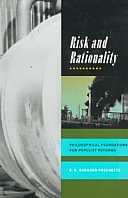 | Title: Risk and rationality: philosophical foundations for populist reforms Author: Shrader-Frechette, K. S 1944- Published: University of California Press, 1991 Subjects: Philosophy | Ethics | Social Problems | Political Theory Publisher's Description: Only ten to twelve percent of Americans would voluntarily live within a mile of a nuclear plant or hazardous waste facility. But industry spokespersons claim that such risk aversion represents ignorance and paranoia, and they lament that citizen protests have delayed valuable projects and increased their costs.Who is right? In Risk and Rationality , Kristin Shrader-Frechette argues that neither charges of irresponsible endangerment nor countercharges of scientific illiteracy frame the issues properly. She examines the debate over methodological norms for risk evaluation and finds analysts arrayed in a spectrum. Points of view extend from cultural relativists who believe that any risk can be justified (since no rational standards are ultimately possible) to naive positivists who believe that risk evaluation can be objective, neutral, and value free. Both camps, she argues, are wrong, because risk evaluation as a social process is rational and objective, even though all risk-evaluation rules are value-laden.Shrader-Frechette defends a middle position called "scientific proceduralism." She shows why extremist views are unreliable, reveals misconceptions underlying current risk-evaluation methods and strategies, and sketches the reforms needed to set hazard assessment and risk evaluation on a publicly defensible foundation.These reforms involve mathematical, economic, ethical, and legal procedures. They constitute a new paradigm for assessment when acceptance of public hazards is rational, recognizing that laypersons are often more rational in their evaluation of societal risks than either experts or governments have acknowledged. Such reforms would provide citizens with more influence in risk decisions and focus on mediating ethical conflicts, rather than seeking to impose the will of experts. Science, she argues, need not preclude democracy. [brief] Similar Items |
| 25. | 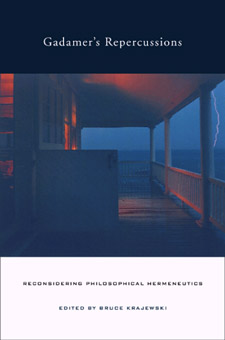 | Title: Gadamer's repercussions: reconsidering philosophical hermeneutics Author: Krajewski, Bruce 1959- Published: University of California Press, 2003 Subjects: Philosophy | Social and Political Thought | European Studies Publisher's Description: Certainly one of the key German philosophers of the twentieth century, Hans-Georg Gadamer also influenced the study of literature, art, music, sacred and legal texts, and medicine. Indeed, while much attention has been focused on Gadamer's writings about ancient Greek and modern German philosophy, the relevance of his work for other disciplines is only now beginning to be properly considered and understood. In an effort to address this slant, this volume brings together many prominent scholars to assess, re-evaluate, and question Hans-Georg Gadamer's works, as well as his place in intellectual history. The book includes a recent essay by Gadamer on "the task of hermeneutics," as well as essays by distinguished contributors including Jürgen Habermas, Richard Rorty, Gerald Bruns, Georgia Warnke, and many others. The contributors situate Gadamer's views in surprising ways and show that his writings speak to a range of contemporary debates - from constitutional questions to issues of modern art. A controversial final section attempts to uncover and clarify Gadamer's history in relation to National Socialism. More an investigation and questioning than a celebration of this venerable and profoundly influential philosopher, this collection will become a catalyst for any future rethinking of philosophical hermeneutics, as well as a significant starting place for rereading and reviewing Hans-Georg Gadamer. [brief] Similar Items |
| 26. | 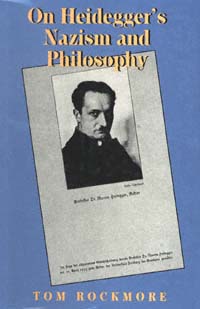 | Title: On Heidegger's Nazism and philosophy Author: Rockmore, Tom 1942- Published: University of California Press, 1991 Subjects: Philosophy | Social and Political Thought | German Studies | Intellectual History Publisher's Description: That Martin Heidegger supported National Socialism has long been common knowledge. Yet the relation between his philosophy and political commitments remains highly contentious and recently has erupted into a vociferous debate. Boldly refuting arguments that the philosopher's political stance was accidental or adopted under coercion, Rockmore argues that Heidegger's philosophical thought and his Nazism are inseparably intertwined, that he turned to National Socialism on the basis of his philosophy, and that his later evolution is largely determined by his continuing concern with Nazism.After developing a framework that clearly outlines the interrelation of Nazism and Heidegger's philosophy, Rockmore analyzes the famous rectoral address the philosopher delivered in 1933 upon becoming rector of the University of Freiburg. In that speech Heidegger sought to ground politics in philosophy. Rockmore examines the inseparable relation of politics and philosophy in Heidegger's Being and Time , the recently published Contributions to Philosophy (written from 1936 to 1938), and the interpretations of Hölderlin, Nietzsche, and technology.In his conclusion Rockmore considers the ongoing discussion of Heidegger's thought and Nazism in France. Combining extensive documentation of the Heidegger controversy with philosophical and historical analysis, this book raises profound questions about the social and political responsibility of philosophy. [brief] Similar Items |
| 27. | 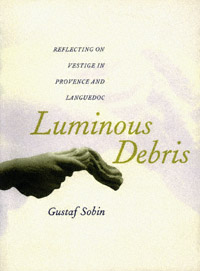 | Title: Luminous debris: reflecting on vestige in Provence and Languedoc Author: Sobin, Gustaf Published: University of California Press, 2000 Subjects: Literature | Cultural Anthropology | European Studies | Ancient History | Philosophy | French Studies Publisher's Description: Interpreting vestige with the eloquence of a poet and the knowledge of a field archaeologist, Gustaf Sobin explores his elected terrain: the landscapes of Provence and Languedoc. Drawing on prehistory, protohistory, and Gallo-Roman antiquity, the twenty-six essays in this book focus on a particular place or artifact for the relevance inherent in each. A Bronze Age earring or the rippling wave pattern in Massiolite ceramic are more than archival curiosities for Sobin. Instead they invite inquiry and speculation on existence itself: Artifacts are read as realia, and history as an uninterrupted sequence of object lessons.As much travel writing as meditative discourse, Luminous Debris is enhanced by a prose that tracks, questions, and reflects on the materials invoked. Sobin engages the reader with precise descriptions of those very materials and the messages to be gleaned from their examination, be they existential, ethical, or political.An American expatriate living in Provence for the past thirty-five years, Gustaf Sobin shares his enthusiasm for his adopted landscape and for a vertical interpretation of its strata. In Luminous Debris he creates meaning out of matter and celebrates instances of reality, past and present. [brief] Similar Items |
| 28. | 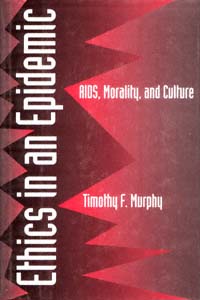 | Title: Ethics in an epidemic: AIDS, morality, and culture Author: Murphy, Timothy F 1955- Published: University of California Press, 1994 Subjects: Philosophy | Sociology | Ethics | Medicine | Social Problems Publisher's Description: AIDS strikes most heavily at those already marginalized by conventional society. With no immediate prospect of vaccination or cure, how can liberty, dignity, and reasoned hope be preserved in the shadow of an epidemic? In this humane and graceful book, philosopher Timothy Murphy offers insight into our attempts - popular and academic, American and non-American, scientific and political - to make moral sense of pain.Murphy addresses the complex moral questions raised by AIDS for health-care workers, politicians, policy makers, and even people with AIDS themselves. He ranges widely, analyzing contrasting visions of the origin and the future of the epidemic, the moral and political functions of obituaries, the uncertain value of celebrity involvement in anti-AIDS education, the functional uses of AIDS in the discourse of presidential campaigns, the exclusionary function of HIV testing for immigrants, the priority given to AIDS on the national health agenda, and the hypnotic publicity given to "innocent" victims.Murphy's discussions of the many social and political confusions about AIDS are unified by his attempt to articulate the moral assumptions framing our interpretations of the epidemic. By understanding those assumptions, we will be in a better position to resist self-serving and invidious moralizing, reckless political response, and social censure of the sick and the dying. [brief] Similar Items |
| 29. | 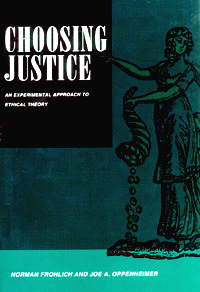 | Title: Choosing justice: an experimental approach to ethical theory Author: Frohlich, Norman Published: University of California Press, 1992 Subjects: Politics | Economics and Business | Philosophy | Political Theory | Social Theory | Ethics Similar Items |
| 30. | 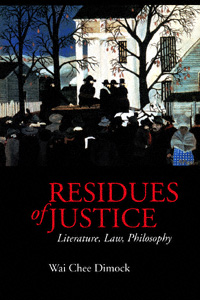 | Title: Residues of justice: literature, law, philosophy Author: Dimock, Wai-chee 1953- Published: University of California Press, 1996 Subjects: Literature | Literary Theory and Criticism | American Studies | Law | Philosophy Publisher's Description: In this arresting book, Wai Chee Dimock takes on the philosophical tradition from Kant to Rawls, challenging its conception of justice as foundational, self-evident, and all-encompassing. The idea of justice is based on the premise that the world can be resolved into commensurate terms: punishment equal to the crime, redress equal to the injury, benefit equal to the desert. Dimock focuses, however, on what remains unexhausted, unrecovered, and noncorresponding in the exercise of justice. To honor these "residues," she turns to literature, which, in its linguistic density, transposes the clean abstractions of law and philosophy into persistent shadows, the abiding presence of the incommensurate. Justice can only be a partial answer to the phenomenon of human conflict.In arguing for justice as an incomplete virtue, Dimock draws upon legal history, political philosophy, linguistics, theology, and feminist theory; she discusses Aristotle and Augustine, Locke and Luther, Marx and Durkheim, Michael Sandel and Carol Gilligan, Noam Chomsky and Mary Ann Glendon. She also examines an unusual configuration of nineteenth-century American authors, pairing figures such as Herman Melville and Rebecca Harding Davis, Walt Whitman and Susan Warner.The result is a book both passionate and scholarly. It invites us to rethink the meanings of literature, law, and philosophy, and to imagine a language of community more supple and more nuanced than the language of justice. [brief] Similar Items |
| 31. |  | Title: Descartes's imagination: proportion, images, and the activity of thinking Author: Sepper, Dennis L Published: University of California Press, 1996 Subjects: Philosophy | History and Philosophy of Science Publisher's Description: Renè Descartes is commonly portrayed as a strict rationalist, a philosopher who theorized a radical, unresolvable split between mind and body. In this long-overdue examination of the role of imagination in Descartes's thought, Dennis Sepper reveals a Descartes quite different from the usual dualistic portrayals and offers a critical reconception of the genesis and nature of the philosopher's thought.In a vigorous analysis of the less-known early works, Sepper finds that initially Descartes assigned the imagination a central role in the mind's activity. Although Descartes eventually lost confidence in the philosophy of imagination, an early understanding of its central role in cognition came to shape the most fundamental notions of his mature philosophy. Sepper's radical reassessment of Descartes ultimately raises new questions about the development of modern philosophy. [brief] Similar Items |
| 32. | 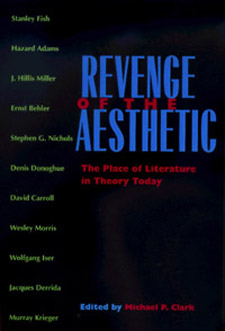 | Title: Revenge of the aesthetic: the place of literature in theory today Author: Clark, Michael 1950- Published: University of California Press, 2000 Subjects: Literature | Literary Theory and Criticism | Philosophy Publisher's Description: This cutting-edge collection of essays showcases the work of some of the most influential theorists of the past thirty years as they grapple with the question of how literature should be treated in contemporary theory. The contributors challenge trends that have recently dominated the field--especially those that emphasize social and political issues over close reading and other analytic methods traditionally associated with literary criticism. Written especially for this collection, these essays argue for the importance of aesthetics, poetics, and aesthetic theory as they present new and stimulating perspectives on the directions which theory and criticism will take in the future. In addition to providing a selection of distinguished critics writing at their best, this collection is valuable because it represents a variety of fields and perspectives that are not usually found together in the same volume. Michael Clark's introduction provides a concise, cogent history of major developments and trends in literary theory from World War II to the present, making the entire volume essential reading for students and scholars of literature, literary theory, and philosophy. [brief] Similar Items |
| 33. | 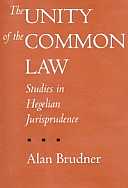 | Title: The unity of the common law: studies in Hegelian jurisprudence Author: Brudner, Alan Published: University of California Press, 1995 Subjects: Philosophy | Law | Social and Political Thought | Political Theory Publisher's Description: Countering the influential view of Critical Legal Studies that law is an incoherent mixture of conflicting political ideologies, this book forges a new paradigm for understanding the common law as being unified and systematic. Alan Brudner applies Hegel's legal and moral philosophy to fashion a comprehensive synthesis of the common law of property, contract, tort, and crime.At a time when there is a strong tendency among scholars to view the common law as essentially fragmentary, inconsistent, and contradictory, Brudner suggests instead a coherence that synthesizes several interrelated dichotomies: good-centered and right-based legal paradigms, instrumental and non-instrumental conceptions of law, externalist and internalist interpretations of the common law system, and communitarian and individualist attempts to found the legal enterprise.Brudner covers genuinely new ground through an interpretation of the common law from the standpoint of Hegelian legal philosophy. His unifying notion of common law corresponds to Hegel's notion of Geist , suggesting a designation of the mutual dependence of the community and the atomistic self for their confirmation as ends. [brief] Similar Items |
| 34. | 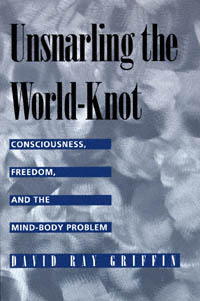 | Title: Unsnarling the world-knot: consciousness, freedom, and the mind-body problem Author: Griffin, David Ray 1939- Published: University of California Press, 1998 Subjects: Philosophy | Intellectual History Publisher's Description: The mind-body problem, which Schopenhauer called the "world-knot," has been a central problem for philosophy since the time of Descartes. Among realists - those who accept the reality of the physical world - the two dominant approaches have been dualism and materialism, but there is a growing consensus that, if we are ever to understand how mind and body are related, a radically new approach is required.David Ray Griffin develops a third form of realism, one that resolves the basic problem (common to dualism and materialism) of the continued acceptance of the Cartesian view of matter. In dialogue with various philosophers, including Dennett, Kim, McGinn, Nagel, Seager, Searle, and Strawson, Griffin shows that materialist physicalism is even more problematic than dualism. He proposes instead a pan-experientialist physicalism grounded in the process philosophy of Alfred North Whitehead. Answering those who have rejected "pan-psychism" as obviously absurd, Griffin argues compellingly that pan-experientialism, by taking experience and spontaneity as fully natural, can finally provide a naturalistic account of the emergence of consciousness - an account that also does justice to the freedom that we all presuppose in practice. [brief] Similar Items |
| 35. | 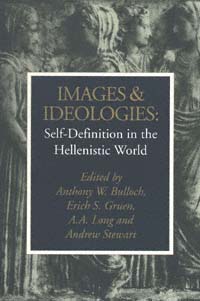 | Title: Images and ideologies: self-definition in the Hellenistic world Author: Bulloch, A. W Published: University of California Press, 1994 Subjects: Classics | Philosophy | Classical Philosophy | Ancient History | Art History Publisher's Description: This volume captures the individuality, the national and personal identity, the cultural exchange, and the self-consciousness that have long been sensed as peculiarly potent in the Hellenistic world. The fields of history, literature, art, philosophy, and religion are each presented using the format of two essays followed by a response.Conveying the direction and focus of Hellenistic learning, eighteen leading scholars discuss issues of liberty versus domination, appropriation versus accommodation, the increasing diversity of citizen roles and the dress and gesture appropriate to them, and the accompanying religious and philosophical ferment. The result is an arresting view of the incredible and unprecedented diversity of the Hellenistic world. [brief] Similar Items |
| 36. | 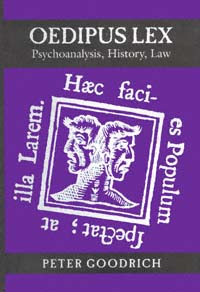 | Title: Oedipus lex: psychoanalysis, history, law Author: Goodrich, Peter 1954- Published: University of California Press, 1995 Subjects: Philosophy | Social and Political Thought | Law | Intellectual History Publisher's Description: Oedipus Lex offers an original and evocative reading of legal history and institutional practice in the light of psychoanalysis and aesthetics. It explores the unconscious of law through a wealth of historical and contemporary examples. Peter Goodrich provides an anatomy of law's melancholy and boredom, of addiction to law, of legal repressions, and the aesthetics of jurisprudence. He retraces the genealogy of law and invokes the failures and exclusions - the poets, women, and outsiders - that legal science has left in its wake.Goodrich analyzes the role and power of the image of law and details the history of law's plural jurisdictions and traditions of resistance to law. He explores mechanisms of repression and representation as constituents of modern subjectivity, using long-abandoned medieval texts and early appearances of feminism as resources for the understanding and renewal of legal scholarship. Not simply deconstruction but also reconstruction, this work is keenly attuned to the discontinuties, silences, and gaps in the cultural tradition called law. [brief] Similar Items |
| 37. | 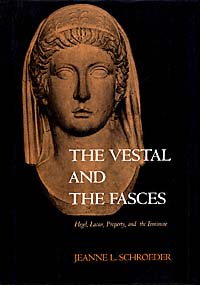 | Title: The vestal and the fasces: Hegel, Lacan, property, and the feminine Author: Schroeder, Jeanne Lorraine Published: University of California Press, 1998 Subjects: Law | Philosophy | Gender Studies Publisher's Description: In this feminist exploration of the erotics of the marketplace, Hegel's notion of property and Lacan's idea of the phallus serve parallel functions in creating the subjectivity necessary for self-actualization. Subjectivity requires intersubjective relationships mediated through a regime of possessing, enjoying, and exchanging an object of desire. For Hegel, this regime is property; for Lacan, it is sexuality, symbolized by the Phallus, which we conflate with the male organ and the female body. Property law, in Jeanne Schroeder's account, is implicitly figured by similar anatomical metaphors for that which men wish to possess and that which women try to be and enjoy. This is reflected in imagery taken from ancient Rome - the axe and bundle of sticks known as the Fasces, and the virgin priestess called the Vestal.Schroeder traces the persistence of phallic metaphors in modern jurisprudence. Rejecting the dominant schools of legal feminism, she reconceptualizes property - the legal relationship as well as its not necessarily material object - as a necessary moment in the human struggle for love and recognition. The Feminine, for Schroeder, is the radical negativity at the heart of both Lacan's split subject and Hegel's concept of freedom. Feminine emancipation and private property are, therefore, equally necessary conditions for the actualization of the free individual and the just society. Feminist scholars, social theorists, political scientists, philosophers, and lawyers will find in Schroeder's analysis scintillating new perspectives on property theory and the feminine within the market and the law. [brief] Similar Items |
| 38. | 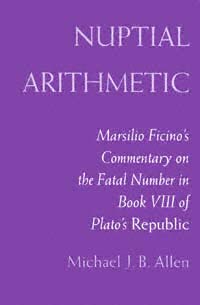 | Title: Nuptial arithmetic: Marsilio Ficino's commentary on the fatal number in Book VIII of Plato's Republic Author: Allen, Michael J. B Published: University of California Press, 1994 Subjects: Classics | Philosophy | Medieval Studies | Renaissance History Publisher's Description: The latest of Michael Allen's distinguished studies of the Renaissance Neoplatonist, Marsilio Ficino (1433-1499), presents a difficult, fascinating text. Late in his career, Ficino wrote a commentary on the intractable passage in Book VIII of Plato's Republic that concerns the mysterious geometric or "fatal" number. He was thus the first modern interpreter of this famous passage, and Allen is the first in our era to translate and elucidate his remarkable commentary.Allen's critical translation of Ficino's analysis of the fatal number passage shows how it develops philosophical, psychological, numerological, astrological, and prophetic themes that had a particular resonance at the end of the fifteenth century. [brief] Similar Items |
| 39. | 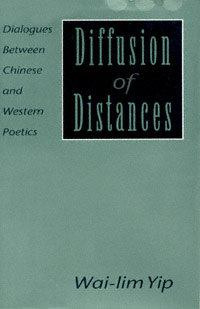 | Title: Diffusion of distances: dialogues between Chinese and Western poetics Author: Yip, Wai-lim Published: University of California Press, 1993 Subjects: Literature | Asian Studies | Philosophy | China | Asian Literature Publisher's Description: In this collection of passionately argued essays, the internationally acclaimed poet and critic Wai-lim Yip calls Western scholarship to account for its treacherous representation of non-Western literature. Yip moves from Plato to Hans-Georg Gadamer, from Chuang-tzu to Mao Tse-tung, from John Donne to Robert Creeley, as he attempts to create a double consciousness that includes the state of mind of the original author and the expressive potentials of the target language. He aims, first, to expose the types of distortions that have occurred in the process of translation from one language to another and, second, to propose guidelines that will prevent this kind of linguistic violence in the future. [brief] Similar Items |
| 40. | 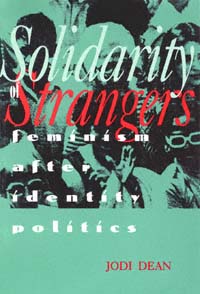 | Title: Solidarity of strangers: feminism after identity politics Author: Dean, Jodi 1962- Published: University of California Press, 1996 Subjects: Gender Studies | Postcolonial Studies | Women's Studies | Politics | Philosophy Publisher's Description: Solidarity of Strangers is a crucial intervention in feminist, multicultural, and legal debates that will ignite a rethinking of the meaning of difference, community, and participatory democracy. Arguing for a solidarity rooted in a respect for difference, Dean offers a broad vision of the shape of . . . [more] Similar Items |